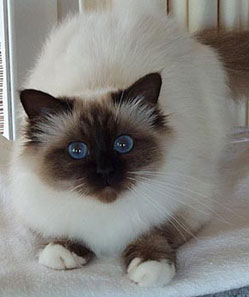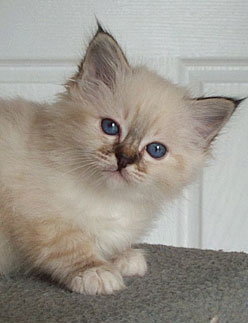Birmans and their Care
Description
The face of the Birman is a conventional cat face, not compromised by extremes. The expression should be sweet with characteristic blue eyes set wide in a broad face. They come in a variety of colours with the traditional Seal and Blue points still being favourites. However, chocolate, lilac, red, cream, tortie and even tabby points are available. Mention of the fine features of the Birman cannot be complete without discussion of the 'gloves and gauntlets'.
These are the very distinctive white feet of the Birman that make our breed one of the most difficult for the show bench. For the pet owner, suffice to say that a Birman should ideally have even gloves on all four feet with the gauntlets being the spearhead of white up the back hocks. This feature is much easier discussed than achieved!
Birmans possess wonderful characters and because they are loving, gentle cats, will fit into virtually any home. They can become very devoted to their owners and often walk with you or between your feet! They are not overly vocal cats, but still manage to make their feelings known by the flick of a tail or the deep stare of their sapphire blue eyes. They thrive on your companionship and appreciate the company of another cat if they are to be left alone for long periods while their owners are at work.
The Birman is a semi-longhaired breed. The coat is non-matting, soft, silky and easy care. The coat requires grooming once weekly with powder, comb and brush. Birmans are actually classed as a semi-longhair due to the fact that their coats do not achieve the length or texture of the pedigree Persian. The coat however, still reaches a pleasing length and as a bonus, does not require daily grooming. It does need to be groomed weekly however, as no cat will be maintenance free!
Grooming
Even though a Birman has a very easy care long coat, this does not mean it never requires grooming. It is still recommended that you brush and comb your Birman once a week. In the spring it may also be a good idea to give your cat a bath using a hand held shower nozzle, gently over the skin. Use a 'wool wash' or gentle cat shampoo to clean your cats coat and help loosen the dead fur in the early moult. You should invest in a cat comb with rotating teeth. These are gentle on the cat but will remove a lot of dead fur. The other essential is a "slicker" brush. This is a square brush with fine metal bent teeth.
Ensure you clip your cats claws every month so they do not grow too sharp or long. This is very important for indoor cats as the claws can become so long they turn around and dig into the paw pad. This will cause infection and difficulty walking. It is not a difficult procedure but is best trained from an early age to accept it. Simply press your thumb gently into the back of the foot while holding it. This will extend the claws. You will see the claws are like your own nails, pink at the bottom due to blood flow and white at the long tips. The white is the part that is safe to cut and you only need to take the tip off using a pair of nail clippers
Also check your cats mouth at regular intervals. They are not brushing their teeth every day so their teeth can become troublesome and need veterinary cleaning as they age. Bad teeth are just as painful for your cat as for you! Eating will become a problem if the mouth is sore or infected. Try to train your cat to chew strips of meat or bones such as chicken wings or lamb brisket. This is not successful for all cats as they can be amazingly lazy for carnivores! If they will take to this type of food it can have life long benefits for the health of their mouth. There are also Dental biscuits available from your vet or pet store, these will help prevent or delay the need for a full dental treatment.
The breeder you buy your Birman from should supply you with a diet information sheet so you can settle your new kitten into its new home with the minimum of stress. It is important that you use this guide.


